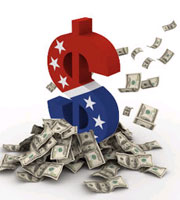Rising oil prices threaten US recovery
24 Feb 2011
With the US economy still struggling to recover from the recession, it is feared that a sustained and significant rise in oil prices could derail the recovery process by fuelling inflation and putting the brakes on spending.
 Oil futures touched $100 a barrel at the New York Mercantile Exchange on Wednesday - the highest since before the financial crisis hit in late 2008 - before pulling back. Costlier oil drives up the costs of everything from gas at the pump to the raw materials used to make nylon and food packaging. That could mean higher inflation and prompt consumers, who lately have shown more willingness to spend, to cut back their purchases.
Oil futures touched $100 a barrel at the New York Mercantile Exchange on Wednesday - the highest since before the financial crisis hit in late 2008 - before pulling back. Costlier oil drives up the costs of everything from gas at the pump to the raw materials used to make nylon and food packaging. That could mean higher inflation and prompt consumers, who lately have shown more willingness to spend, to cut back their purchases.
Oil prices surged, propelled by upheaval in Libya and disruptions to its crude supplies. Nymex futures rose to $100 a barrel, the contract's highest price since 2008.
Oil prices have risen 7.35 per cent since the beginning of the year, while gasoline futures have risen 10.67 per cent.
The question now is whether turmoil in the Middle East and Northern Africa could lead to a sustained cutback in production or delivery disruptions that could drive those prices much higher and push the US as well as other countries back into recession. Supply-driven oil shocks, like the ones that came with the 1973 oil embargo and the 1979 Iranian revolution, were factors in past recessions.
Most economists reckon that the price of oil would have to rise to at least $120 a barrel, and stay there, to threaten the recovery.



















